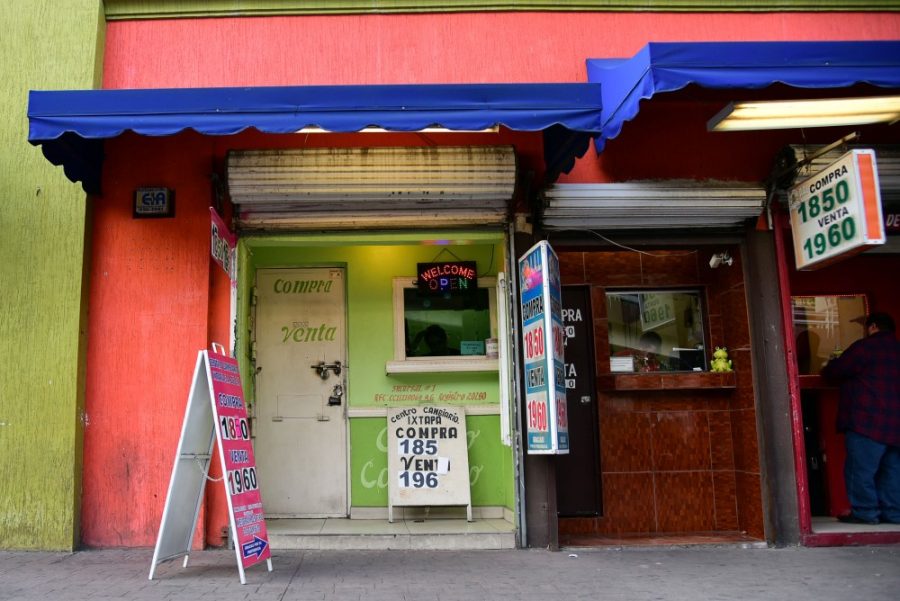Down Morley Avenue, one side of the street is lined with storefronts selling girls’ party clothes and bright plastic toys. On the other side, tents and tables occupy what’s usually a vacant parking lot.
Each table is laden with an assortment of produce and homemade treats, from kale and yellow butternut squash, to pomegranates, empanadas, and different cheeses. A big metal pot between the crates of food lure Nogalenses with the rich scent of carne con chile tamales.
Friday afternoons, near the border that separates Nogales and Sonora, people gather to listen to Latino hits and to enjoy the food at the Nogales Mercado.
In 2012 the Mariposa Community Health Center (MCHC) and Nogales Community Development (NCD) partnered to found the Nogales Mercado. Their aim is to improve health and bring better economic sustainability to Nogales, which is classified as a food desert by the United States Department of Agriculture. A food desert is an area with a scarcity of low-priced healthy fruits and vegetables.
“The market was an opportunity for the community to invest in their health and in their economy,” says Santos Yescas, program manager at the NCD.
The Nogales Mercado features a mesa cooperativa, a consignment table, where local farmers, some local and some providing from their Tucson farms, can sell their product without having to attend the market. Other vendors must set up their own tables to sell products. Many of them sell merchandise on Fridays to bring in a bit more cash for their families.
Maria Elena Mandel, 60 years old, has sold her homemade soaps, bath scrubs, purses, jewelry and cards at the market since 2013 to pay her living expenses.
Mandel’s dark brown hair is flecked with white and pulled back in a tight bun. She greets everyone with a smile.
She calls these workdays her “social Fridays,” because she meets people from all over town.
At home, she makes all of her products while also caring for her son who has cancer. Though her son’s health expenses are paid, Mandel still has to work to get food on the table and pay other bills.
For now, her business headquarters is a folding table that sits under a plastic roof every Friday.
“This is my venture,” Mandel says.
A few tents away from Mandel, Hilda Rivera tends to her budding business.
In a clean white apron, standing in front of a sign with the bold, white word “TAMALES” on a bright red background, Rivera serves her customers, who have eagerly lined up at her station.
Rivera joined the market a year ago after friends urged her to sell something at a Día de los Muertos event. She came intending to sell flower arrangements and only brought her tamales as an extra product.
However, her tamales sold out. Rivera now sells them every Friday, and is planning to expand her product line.
“I am working on selling frozen tamales that people can take home and heat up,” Rivera says, opening a cooler to show a stack of tamales packed in ice.
Rivera, a volunteer at the Mariposa Community Health Center and self-proclaimed housewife, uses the money she earns at the Nogales Mercado for whatever her and her family may need.
RELATED: 5 places to brunch near UA
As the Nogales Mercado grows, program manager Santos Yescas debates whether he should charge the vendors for their spot in the market, which is now free.
Nogales Community Development gives vendors lessons in business finances, and helps them receive certification to accept WIC, SNAP and FMNP checks, all without charge.
However, Yescas believes vendors should invest in their own businesses, starting with their spot in the market.
“Sometimes vendors do not show up,” says Yescas. “And we need them here to attract people to the market.”
Natalie Ainza, food system coordinator at MCHC, knows many people do not come to the mercado for the organic fruits and vegetables at the mesa cooperativa. But she remains optimistic.
Demonstrating how to use the products in a recipe at a recent Friday market, Ainza tosses pomegranates, ice, kale and other greens into a blender and pours the green liquid into a cup: a green juice.
“It’s all part of the same learning process,” Ainza says.
Raul Ulloa, 67, attends every Friday and says he tries to buy from every vendor—from Rivera’s tamales with a cafecito, to whatever the consignment table is offering.
“I eat everything,” Ulloa says.
He also participates in the Friday bike ride organized by OS3, an organization that promotes biking in Nogales.
Three years ago, the organization found a home in the farmer’s market, where it grew from eight to 10 bike riders a week to 80 riders.
Each Friday, children in helmets and adults in full biking gear ride the nine miles from downtown Nogales to the Safeway on Mariposa Road, right off the interstate.
“We love to help our community,” says Melissa Maldonado, president of OS3.
In the future Yescas and Ainza hope to see rows of tents to the other end of the lot, and a place where people can gather from all over, not just Nogales.
“We’re here to help,” Ainza says.









